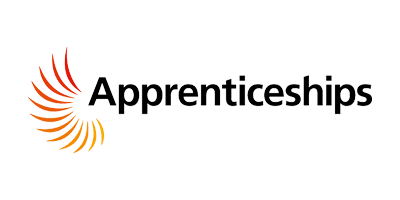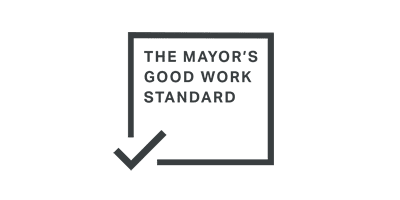Tag: college
To mark The Queen’s Platinum Jubilee we’ve trawled the Capital City College Group (CCCG) archives to uncover our many connections to Her Majesty at our colleges.
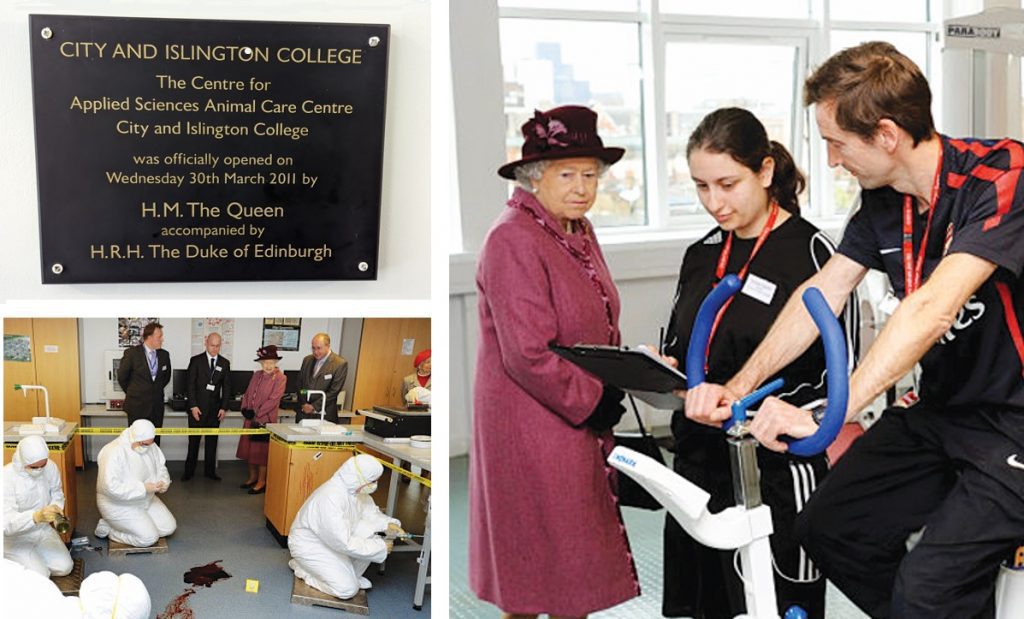
Her Majesty The Queen and HRH The Duke of Edinburgh visited the college’s Centre for Applied Sciences in 2011. During the visit the Queen unveiled two plaques marking the official opening of the college’s Animal Care Centre and an accreditation by the National Skills Academy Process Industries which recognised the college as a Centre of Excellence for Biotechnology. Her Majesty got up close to some of the animals at the care centre and was given a tour of the college’s forensics, optics and sports science provision, which included a mock crime scene being investigated by students.
In 2007, CANDI received theQueen’s Anniversary Prize for Higher and Further Education for creating Pathways to Employment and Higher Education in the Sciences, the only college at the time to have received this accolade twice. The college previously received the award for widening access and progression to higher education in 1994.
Royal seal of approval for WestKing
WestKing was awarded the Queen’s Anniversary Prize for Higher and Further Education for collaboration and innovation in the culinary arts in 2015.
The awards are presented every two years to universities and colleges that have shown excellence in quality and innovation in providing real benefits to the world through education and training.
At the time, then Principal Andy Wilson said: “The award of the prize to Westminster Kingsway College is one of the greatest moments in the college’s long history. It is recognition of many staff, students and employers who have been involved with the college over the years.”
In 2016 a plaque commemorating the award was unveiled at the college’s Victoria Centre.
Queen’s New Year and Birthday Honours
Here are some of our staff and alumni who have been honoured by The Queen over the years:
- Jamie Oliver – The celebrity chef and restauranteur trained at WestKing and made an MBE in 2003 for services to the hospitality industry.
- Trevor Nelson – The DJ and radio presenter on BBC Radio 1Xtra and BBC Radio 2 who attended WestKing, was awarded an MBE in 2002.
- Timothy Spall – The Bafta-nominated actor, known for his many screen roles including five Harry Potter films, attended WestKing and received an OBE in 2000.
- Garth Crooks – The former Tottenham Hotspur striker and BBC football pundit studied at CONEL and was awarded an OBE in 1999.
- Audley Harrison – The British former super-heavyweight boxer and Olympic gold medallist attended CONEL and was awarded an MBE in 2001
- Pablo Lloyd – The CEO of Visionnaires, a programme started within CCCG, to help aspiring entrepreneurs start new businesses, was made an OBE in 2019.
God Save The Queen
Sex Pistols frontman Johnny Lydon, better known by his stage name Johnny Rotten, and bassist Sid Vicious, real name John Ritchie, attended WestKing before finding fame with their anti-royal punk anthem God Save The Queen. Released during the Queen’s silver jubilee in 1977, the song was banned at the time by the BBC and several commercial radio stations.
Actress and former WestKing student Kathy Burke, perhaps best known for her TV appearances on French and Saunders, and Harry Enfield and Chums, appeared briefly in the 1986 biopic Sid and Nancy about Sid Vicious’s turbulent relationship with his girlfriend Nancy Spungen. She has also played a queen on the big screen, portraying Mary Tudor in Elizabeth, starring Cate Blanchett in the title role.
Artist and fashion designer Tony Mott, who also attended WestKing, is also a punk historian famous for his Mott collection, an archive of UK punk rock and political ephemera that includes over 1,000 posters, flyers, and fanzines featuring bands including the Sex Pistols, The Slits and The Damned.
Many congratulations Your Majesty from everyone at CCCG.
A Women’s Network has been launched by Capital City College Group (CCCG) to promote equality and raise the profile of women across the Group.
The first meeting of the network, chaired by Hilary Moore, Assistant Principal at the College of Haringey, Enfield and North East London, featured a panel of inspiring women:
- Sarah Veale CBE – Former Head of the Equality and Employment Rights at the TUC
- Apinder Sidhu – Diversity and Inclusion Lead at the Education and Training Foundation
- Emma Case – Founder of Women Beyond the Box, a platform supporting neurodivergent women
- Fathia Abiola-Ajishafe – A-Level student and member of the Equality, Diversity and Inclusion Committee at City and Islington College
The panellists shared how they got to where they are today and discussed their experiences at work and how woman can support each other in the workplace and their advice to other women.
The Women’s Network was set up by CCCG’s Learning and Development Team, which hopes to establish similar groups to inspire colleagues and promote inclusivity.
The event combined an in-person event at Westminster Kingsway College’s Victoria Centre and a live stream on YouTube for those unable to attend.
Watch a recording of the live stream here: CCCG Women’s Network Launch – Panel Discussion
Molly Elliston, Group Learning and Development Business Partner, said: “At CCCG, we’re very proud that our Group Leadership Team is gender-balanced and represents our workforce. We believe is right and important to celebrate our women role models, and recognise we have many inspirational women leaders among our teachers, managers, support staff and students
“We started the Women’s Network in response to feedback from colleagues who told us that they would like more peer-to-peer support across the Group on issues that matter to them. We hope it will give colleagues more opportunities to share their experiences that will lead to an even more inclusive working environment. Our network chairs will also support us in making valuable contributions and important decisions relating to our equality, diversity and inclusion plans.
“We hope that the launch of the Women’s Network will be the first of many more sessions, which will bring us closer together and encourage others to start more networks to do the same.”
Here are some memorable quotes from the chair and the panellists of the first meeting of the Women’s Network.
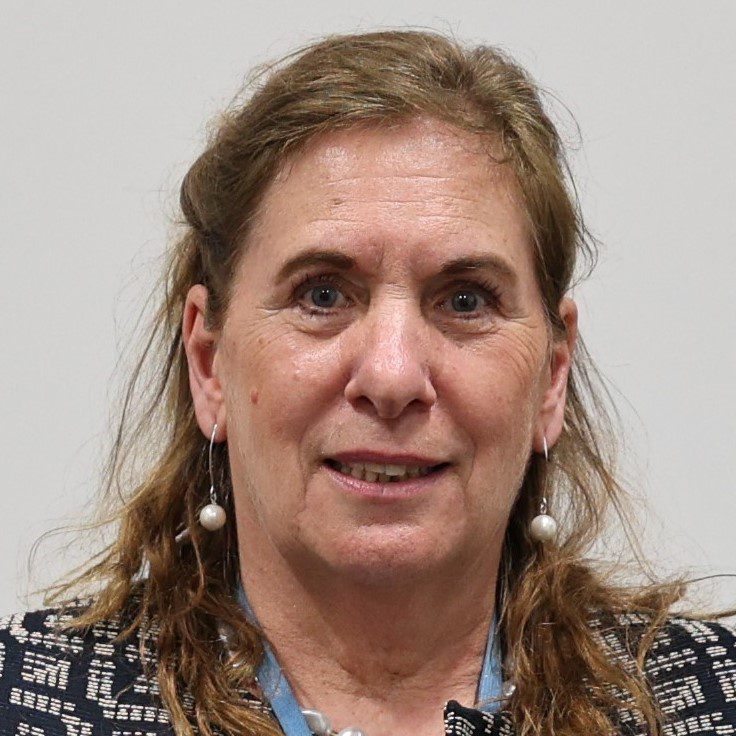
Hilary Moore
Chair and Assistant Principal at the College of Haringey, Enfield and North East London
I came from a background where my parents were the first generation going to university. When I was 11, I decided I was going to become a lawyer. When I went to sixth form college, the careers team, which were nowhere near the quality we have across CCCG, said, “I don’t think it’s a good idea, you might get the grades, but you’ve got no contacts and you’re a woman. Why don’t you become a legal secretary?” I went home and told my mum, who said, “Well I’m not having that,” and my father said, “How ridiculous,” in a very broad Yorkshire accent. I carried on and got a law degree and became a lawyer. It’s things like background and support that can make such a difference.

Sarah Veale CBE
Former Head of the Equality and Employment Rights at the TUC
Workplaces are often competitive. Women sometimes get into this mode of thinking I’ve got to be extra good and fit in better than everybody else in order to be in the same place as the men they’re competing with. It’s about building confidence and challenging the parameters you’re working in.
I’ve noticed that if men are in charge of an interviewing process, they tend to use words like assertive and dynamic. It’s all about power, but never valuing softer skills, like someone who can bring people together and who can explore situations and find solutions by working with other people. It’s a question of elevating the sorts of skills that women are often much better than men, which are valuable to the whole entity, and then owning and pushing them up towards the front.
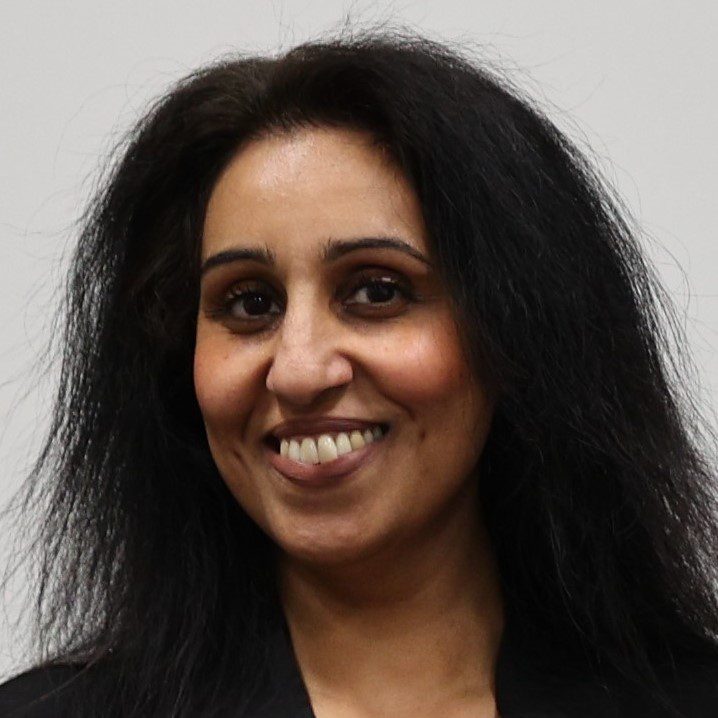
Apinder Sidhu
Diversity and Inclusion Lead at the Education and Training Foundation
I was raised in an area of west London that is predominantly Asian where there is a culture about how you’re perceived as a woman. I left and went to university, but a lot of girls didn’t go and got married because that was the expectation. Luckily my father told us, “You need to do what you need to do, and we’ll talk about marriage later on.”
There’s a dichotomy of what it is like to be a woman growing up with the pressures of culture and community and wanting to listen to your inner voice and do what makes you happy. I’ve had that pressure growing up and going into leadership, looking at how other women did things and what resonates with me. Individuality is really important. It’s not always about being inspiring. When you are genuine and authentic people look up to you.

Emma Case
Founder of Women Beyond the Box, a platform supporting neurodivergent women
There is a quote that says, ‘You can’t be what you can’t see’ and I think that is so important. Representation matters, and we often take it for granted. I currently live in Lisbon, Portugal, and I’ve noticed on television there are very few women, and very few black and brown women. I just wonder what that does to young children because we don’t aspire beyond what we’re told we can be. It isn’t just the verbal, it’s the visual impact, and that is the challenge. It is about intervention and being intentional and making sure everybody sees and experiences something that they can relate to.
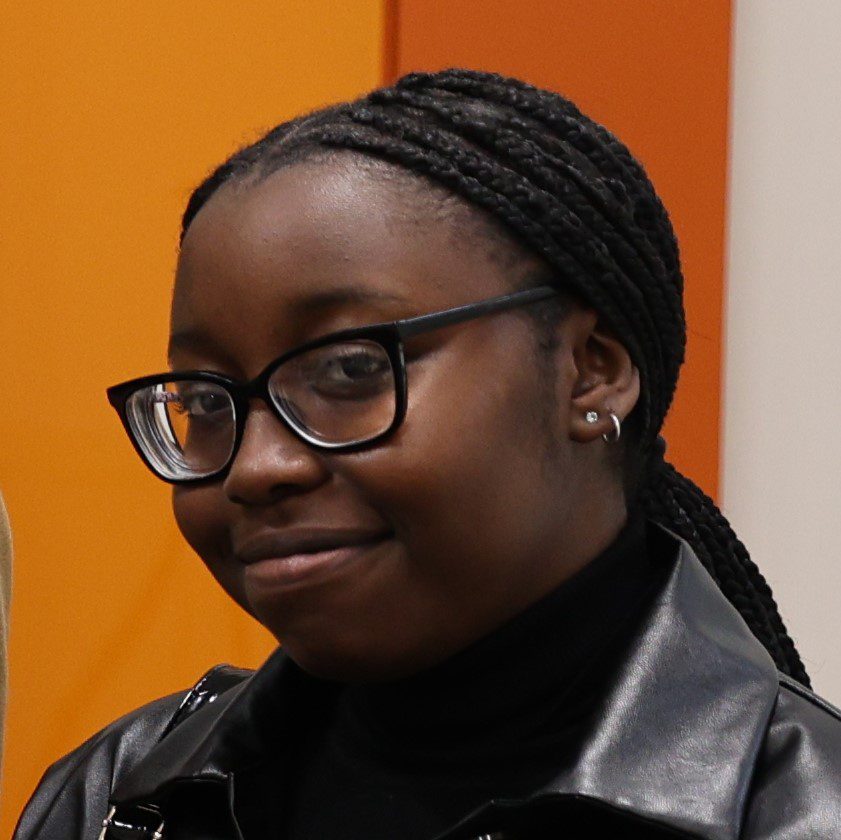
Fathia Abiola-Ajishafe
A-Level student and member of the Equality, Diversity and Inclusion Committee at City and Islington College
Being a black girl from a less well-off area in London makes me feel like I’m not going to have as many opportunities or experiences as someone who grew up in a richer area. But what I do know is that no matter what or where you come from, you can do it. We may not have as many resources or experiences, but there is always a way to get somewhere. That’s what really keeps me going.
Students jumped on board a big yellow American school bus during a week of activities to improve their mental health and wellbeing ahead of their exams.
The bus from the Zen Project arrived at Westminster Kingsway College, as colleges across Capital City College Group marked Mental Health Awareness Week from 9-15 May.
According to the charity Mental Health UK, which is behind the annual awareness week, one in four people in the UK has experienced a mental health problem.
The Zen Project has converted the bus into a mobile studio where students could participate in breathing and meditation exercises and other relaxation techniques.
WestKing student Muhaned Nouman, 21, said: “The exams are now very near and I’m starting to feel a bit anxious. You study for the whole year and you’re scared that it could all be written-off in one paper and you won’t get the grades you deserve.
“Today has been really good at helping us all get away from that pressure. The breathing exercises on the bus made me feel very relaxed and have taken some of my worries away. My mind is a lot clearer and focused. I feel a lot more positive now.”
Students also took part in ‘Talk and Chill’ sessions, that included therapeutic workshops hosted by qualified psychotherapists and tips for managing exam stress.
Other workshops were run by Catch22, which provides practical and emotional support to young people and their families, and online mental health company Kooth.
WestKing music students performed live at the event, which also provided students with information about support available at the college.

City and Islington College (CANDI) ran sessions, around this year’s Mental Health Awareness Week theme of loneliness and the college held workshops for their students on exam stress, social anxiety and emotional resilience.
Students also took part in mindfulness activities including kindness rock making, and writing and designing colourful messages, which were then tied to trees to inspire their peers.
There was also a ‘Chat and Chillax’, ‘OK 2 Talk’, motivation, creative, meditation and safe space drop-in session and various physical activities including football, canoeing, box-fit and yoga.
CANDI student Rebecca Lynch, 16, recalled how her mental health had deteriorated during lockdown, making her feel alone and unable to share how she was feeling with family and friends.
She said: “I felt down and not in good place. I couldn’t even go out to clear my head. I was also home-schooled and didn’t have many friends and often felt left out because they all went to the same school.
“I’ve got exams coming up but I’m not stressing out as I used to, because at the end of the day they don’t define who you are as a person. Failing an exam is not the end of your life, you can always come back from that. I’m not saying it doesn’t matter, it’s just not as big a deal as it’s made out to be.
“The college has facilities to help you. Whether you use them or not, they’re always there. I feel they really do put students first and that mental health is top priority over academic success.”
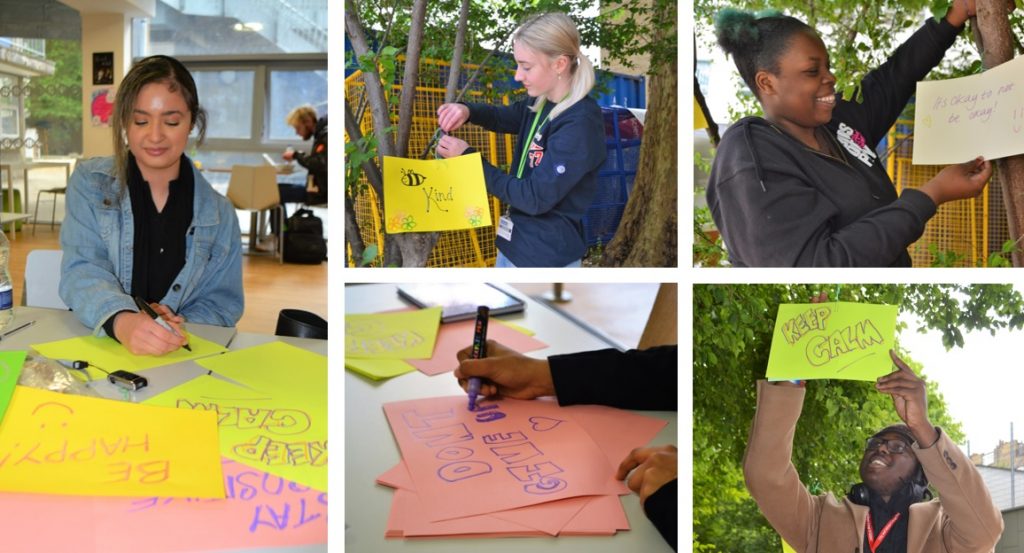
Students at the College of Haringey, Enfield and North East London (CONEL) took part in mental health workshops at the college run by Barnet, Enfield and Haringey Mental Health NHS Trust.
The college regularly runs these workshops, with more than 300 students participating so far this year.
CONEL student Cameron Barrall, 16, said: “Growing up it’s not seen as normal for boys and men to open up about their feelings and suffer in silence, and when you do people are like ‘Get over it, get a grip, cheer up,’ but saying things like that just makes it worse.
“If I’m struggling with something, I just go out and want to be by myself and don’t feel like I need anyone around me, but sometimes that is more difficult and it can help to talk to a family member or someone close to you who you can trust.”

‘I started my own mindfulness business after battling depression’
CONEL student Amaya Agdomar, 45, started her own business Sacr3d Butt3rfly after facing her own mental health battle with anxiety and depression. She organises mindfulness walks and activities in Epping Forest to lift people’s spirits through an appreciation of nature. The threes in Sacr3d Butt3rfly refer to mind, body and spirit.
“There were times when if the NHS hadn’t been there I would found life very difficult. They helped me through and because of that I wanted to start a business helping people who’ve been in my situation in a place with people who care. I was going into Epping Forest myself and feeling all the benefits that have helped with my recovery.”
Nearly 300 students at CONEL have also taken part in Soft Skills For Wellbeing workshops run by the Barrier Breakers Foundation, a charity which helps disadvantaged young people develop skills to reach their potential and enrich their lives.
This week the college also hosted a stand providing information on mental health services available across Haringey, run by Haringey Council, Haringey Mind and the NHS.

All CCCG colleges have trained and dedicated staff and resources to provide information, advice and guidance to support students with a wide range of mental health issues.
Find out more about Student Support and Wellbeing.
A former hairdressing student at the College of Haringey, Enfield and North East London (CONEL) has recalled how cutting the new Doctor Whos’ hair led him to work in TV.
Rwandan-born Ncuti Gatwa, 29, was unveiled as the new Time Lord on 8 May and is also set to appear in a Barbie film out next year starring Margot Robbie and Ryan Gosling.
Silas Baiden, 36, cut Ncuti’s hair for the Netflix hit series Sex Education, six years after the pair had become friends when Silas was working for a BT call centre in Scotland.
Silas runs Ama Hair Salon in south Tottenham, which specialises in Afro-Caribbean hair, with his mum Ama who also trained at CONEL and started the business in 2001.
He said: “Ncuti is one of my best friends. We met at a party in Glasgow and I cut his hair when he moved to London and lived with me and my mum for a couple of years.
“When he got a part in Sex Education, he told me that they were looking for a barber. I was fresh out of college at the time and didn’t feel ready to work on a production, but I nervously went to the set, made some connections and they gave me the job.
“I remember having a bit of imposter syndrome, like I’m not supposed to, or don’t deserve to be here, but now I feel I’ve reached another level. In addition to barbering, I can do braids, cornrows and locks, which are still quite niche things in the TV industry.”
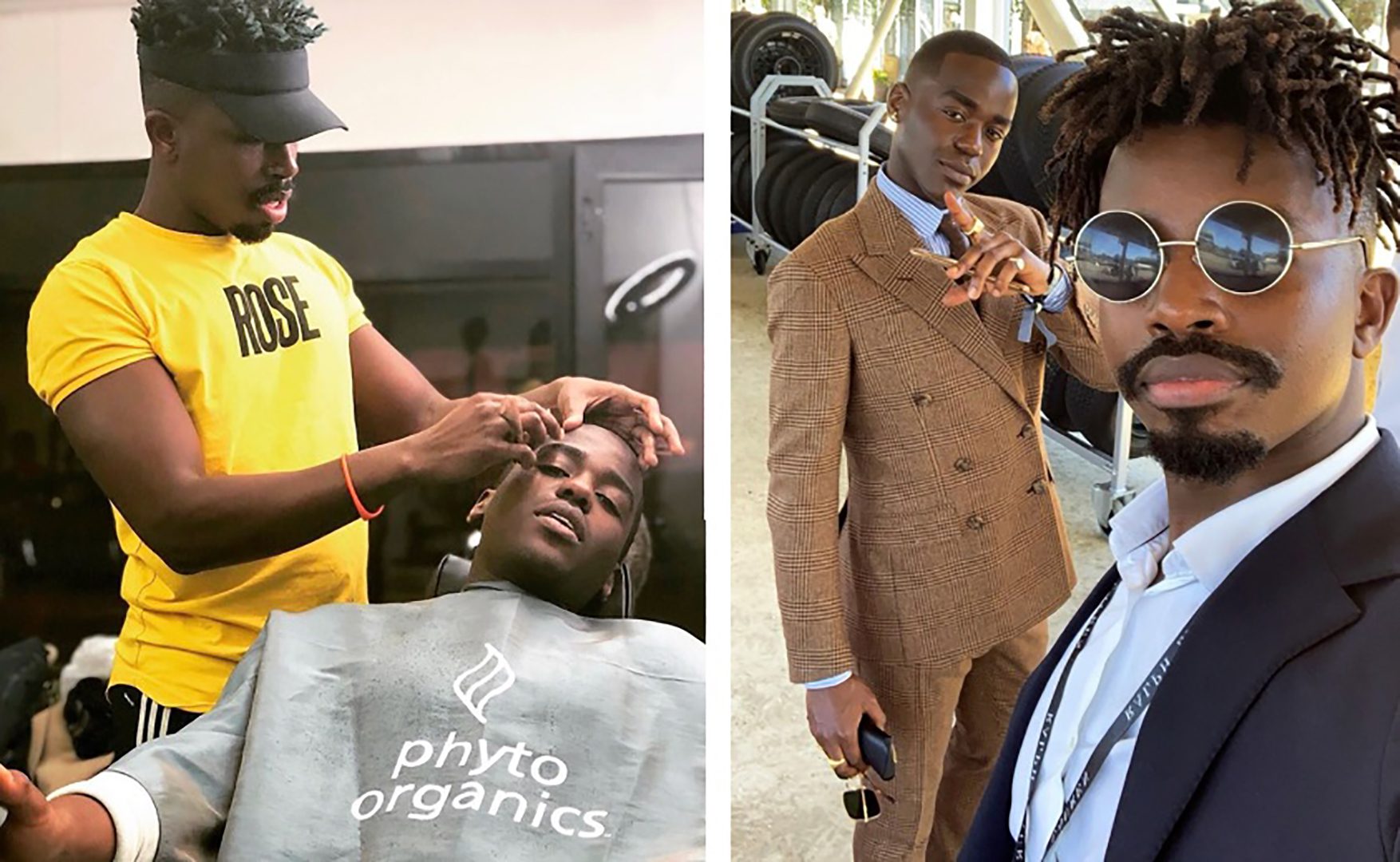
Silas also cut and styled hair on set and at the salon for other cast members including Asa Butterfield, Kedar Williams-Stirling, George Robinson, Chinenye Ezeudu, Jonny Amies and Olive Gray.
Silas has gone on to work on Halo, a TV series based on the video game of the same name, for Paramount+ as well as The Mosquito Coast for Apple TV+.
His other famous clients include actors Yasmin Finney, Clifford Samuels, Morgan Rees, Ariyon Bakare and Karla Chrome and singer Henry Dell.
Ama, 57, came to the UK from Ghana in 1990 with Silas when he was just four years old and initially struggled to find work.
She said: “I used to have my own boutique business in Ghana, so being unemployed was foreign to me. The only job I could get was in catering, but that wasn’t my passion.
“I did my own hair and my grandma’s and some friends back home. I always enjoyed the social aspect of the job and making people feel and look good.”
Ama enrolled on a hairdressing course at CONEL, then the College of North East London, in 1992, and worked in a couple of salons in Tottenham before opening her own.
“The teachers showed us how to become fully fledged hairdressers and made us believe in ourselves. They were very experienced and pushed us to be the best we could be,” she said.
“I did placements at Afro and European salons to gain experience with both textures. They didn’t train in Afro hair at the college at the time, but that has changed now, which is good to see.”
Ama has long been an advocate of natural hair, particularly among the Afro-Caribbean community, and has encouraged her clients not to use relaxers or other chemical treatments.
“The death of George Floyd in America and Black Lives Matter has given black people more confidence to be themselves because it is out there that we’re treated differently,” she said.
“We’ve woken up to accept who we are. I see it in young people and I tell them how lucky they are to be free to wear their hair the way they want to.”
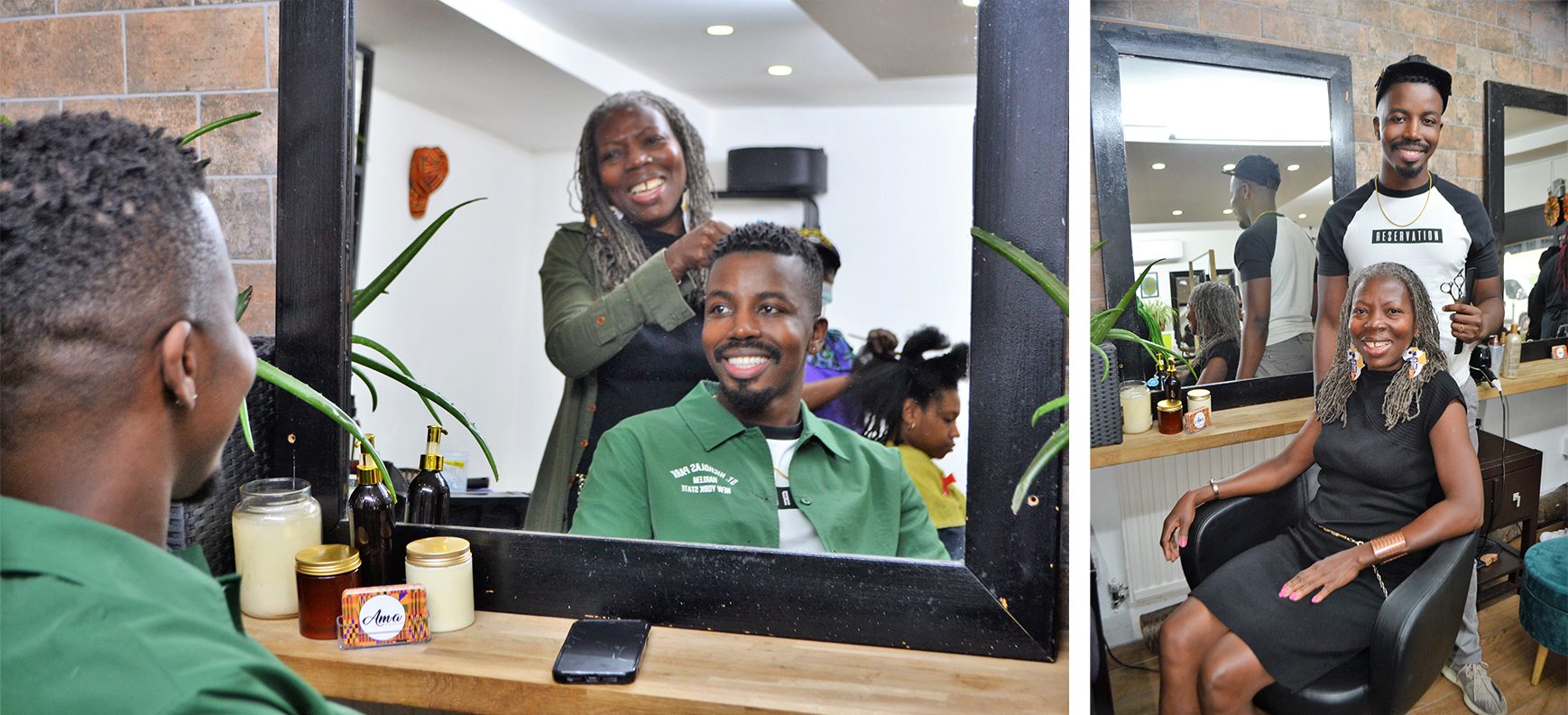
When Silas was younger, he would often help his mum out washing clients’ hair at weekend to earn extra pocket money during which time he learnt to plait and blow dry.
“I’ve always unofficially been an employee of my mum. I used to watch the way she and the rest of her staff would transform people in a few hours and create some magic,” he said.
“Working with my mum is awesome. I’m proud that I’ve been able to continue the business and raise the salon’s profile with new ideas and clientele and put it on the map.”
Ama added: “Silas has made so many wonderful changes to the business and we have been able to grow and increase our turnover. We’re now busier than ever.”
You might not end up cutting Doctor Who’s hair or working for Netflix but now is the right time for you to start your career in hairdressing or barbering with CONEL.
With top-quality training salons in our Tottenham and Enfield sites and excellent tuition to help you gain a recognised qualification, a career in this rewarding industry is within your reach.
Apply now for our Hairdressing and Beauty Therapy courses.
John Poulter was paralysed in a work accident and spent 14 years in recovery. Here he tells his inspiring story about how the College of Haringey, Enfield and North East London (CONEL) gave him the chance to train as an electrician and run his own business.
John Poulter was 42 when his life changed forever.
The father of three was paralysed from the waist down when a forklift driver dropped a heavy pallet on his lower back when he was working as an HGV driver in August 2007.
John said: “I was dropping off a delivery. The forklift driver came out and the first two pallets came off without a problem. He then got a call on his mobile and while he was talking, he hit the tilt button and my life as I knew it ended.”
John’s recovery took 14 years, and he is now an electrician with his own business after training at the College of Haringey, Enfield and North East London (CONEL).
Prior to the accident, John, now 56, had worked as a butcher and served in the British Army in the Falklands, Northern Ireland, Germany, Korea and the first Gulf War.
He was by his own definition “a man mountain” who would spend every spare moment when he was not working at the gym.
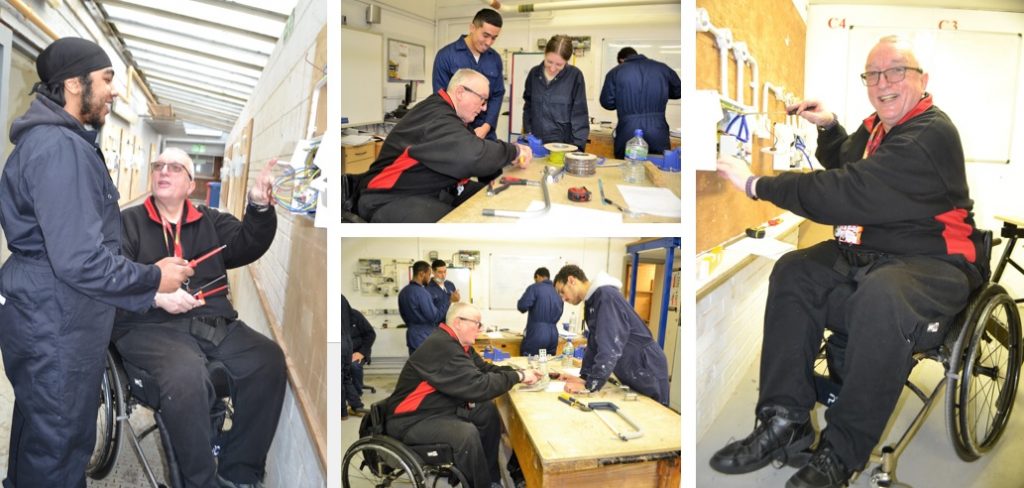
He said: “I had heavy muscle build and was still disciplined after coming out of the Army and wanted to develop myself. At weekends I was weight training and free running up and down hills with air cylinders and kegs to build up my cardio and breaking all my personal bests.”
John was airlifted to the Royal Surrey County Hospital and then transferred to the Royal London Hospital where he underwent two operations and then to a spinal unit at Stoke Mandeville Hospital in Buckinghamshire over the next four weeks.
He then spent the next 18 months at the Royal National Orthopaedic Hospital in Stanmore and over the following 12 years continued to undergo surgery and rehabilitation at Stoke Mandeville.
“Those were the darkest days of my life,” said John.
“I was very angry and the most bitter, twisted individual you could come across. When I first got a wheelchair, I kept asking myself why am I sitting in it, why am I going through this, why me?”
John married his wife Adrienne a year before leaving the Army. They had two sons Craig and Perry and a daughter Becky who were teenagers at the time of the accident.
“I think the impact on them was more than it was on me,” he said.
“My wife has stuck by me through thick and thin. She was hard as nails and straight-faced on the outside but broken on the inside. She never let her appearance show her weakness and that’s what kept me going.”
Medical and psychiatric teams at Stoke Mandeville helped John to overcome his negativity and supported him throughout his recovery.
“My psychotherapist reprogrammed my way of thinking. It took two to three months to trust her and from there we moved forward all the time. Everything in my brain was saying what can I do? I had so much energy but nowhere to divert it,” he said.
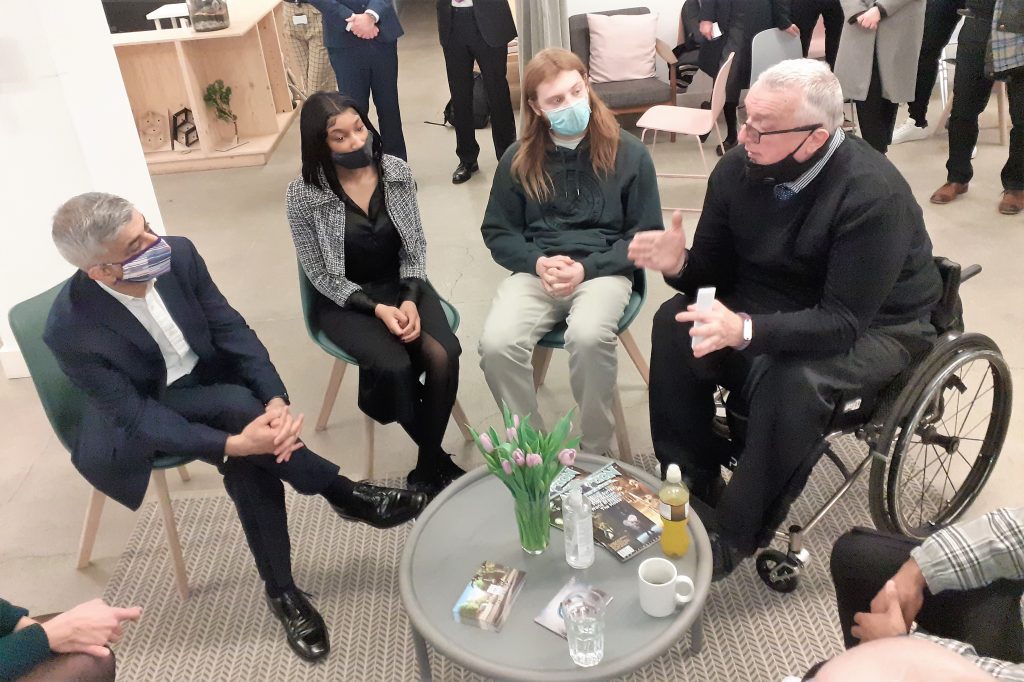
In 2015, while John was living and still undergoing therapy in Buckinghamshire, his doctors asked him what he wanted to do next and suggested he go to college.
He began applying for electrical courses and was turned down by 44 colleges across the UK before being accepted and offered a place at CONEL.
He said: “I kept get red flagged all the time, college after college. Then CONEL took me on the assumption if I prove I can do it, they will put the building blocks in place for me. I told them if you tell or show me something, I’ll soak it up like a sponge and will achieve good results.”
John moved to Tottenham and went on to complete two Electrical Installations diplomas with Distinction at CONEL and became an advocate for diversity and inclusion at the college.
It was something of a homecoming for John who was born and grew up in nearby Enfield.
John said: “I can’t fault anything about CONEL. If it wasn’t for the college, I wouldn’t have moved forward. Everyone at CONEL treated me with dignity and has got my respect for the simple reason they opened one door, and every door after that has followed.”
Towards the end of his time at CONEL John launched his own business, JRP Electrical. He is currently studying for a Level 4 electrical qualification while also giving his time to help and inspire the next generation of electricians at the college.
He runs his business with Adrienne and son Perry, providing the tendering, design and contracting of electrical works for domestic and large developments. When visiting sites he uses ramps, chairlifts, cherry pickers and creepers to aid his mobility.
Earlier this year John met Mayor of London Sadiq Khan at the launch of the Mayor’s Academies Programme, a £44 million investment to provide free skills training to get people into work and boost the capital’s recovery from the COVID pandemic.
CONEL secured £250,000 to run a Green Academy Hub that is working with employers to create training opportunities in the construction and green industries.
“The only person that can tell an individual they can’t do something, is themselves,” he said.
“I don’t admit failure, I never have done. I’ve always given everything 100 per cent commitment and looked at my results and thought can I do better.
“You can and will overcome the challenges you will face. Keep pushing because you will get there in the end. Your best days are not behind you, they are yet to come.”
Find out more about our Construction courses and apprenticeships.



